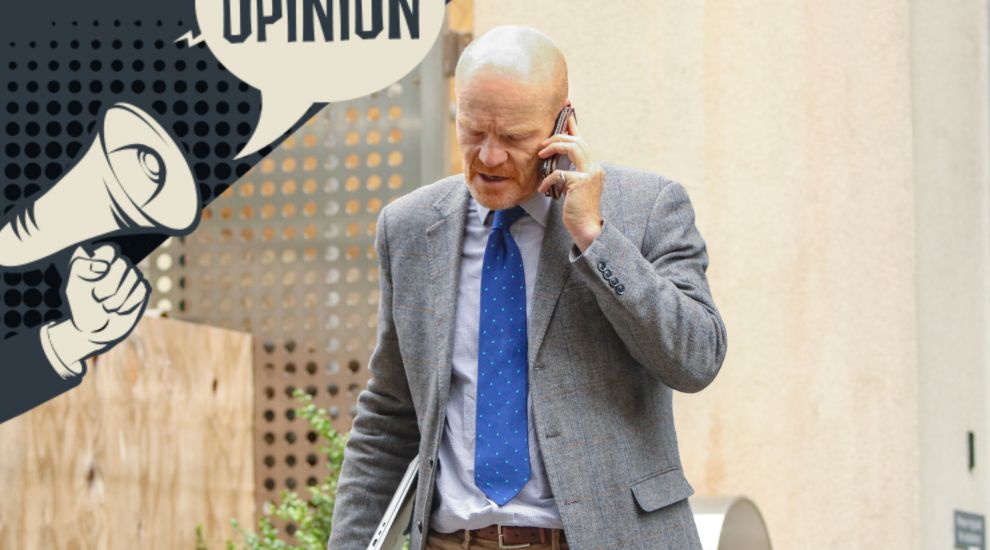


Deputy Gavin St Pier gives his analysis of the States meeting on 27 September, and in doing so looks back on the debate which focused on whether he had abused parliamentary privilege by naming a local doctor in the chamber:
The Order Paper for the last meeting of the States had very little substantive business on it. It had been padded out a little by two items carried forward from the previous meeting. These related to Home Affairs’ policy letter for legislation on domestic abuse and Deputy Vermeulen’s amendment on extending the runway using EMAS technology.
As expected, the domestic abuse proposals glided through quickly with little debate and no opposition. It was another example of the success of the Committee’s low key and workaday approach, under the leadership of Deputy Prow, to their programme of work.
Deputy Vermeulen was not so successful. The more recent history in the latest chapter of the long-running saga that is the debate on extending the runway, runs like this. In October 2018, the late Deputy Jan Kuttelwascher was successful with a Requete that directed the States’ Trading Supervisory Board (STSB) to look at extending the runway within the airport’s existing boundaries. A few months later, in April 2019, Deputies Parkinson and Ferbrache, tried but failed by one vote, to shift this work to the Committee for Economic Development (ED) as “the most appropriate body.” In September 2019, the States agreed with the STSB’s recommendation that no further work be undertaken on the Kuttelwascher proposal. Undeterred, Deputies Kuttelwascher and Ferbrache brought another successful Requete to shift the work to ED, then chaired by Deputy Ferbrache. Four years and several hundred thousand pounds on, with the support of Deputy Ferbrache, ED were successful in persuading the States to pass the parcel back to the STSB to consider as they start to think about the next re-surfacing of the runway. Despite only four members supporting the amendment, it would be very reasonable to assume that a future Assembly will re-debate the matter again, no doubt arguing that it should be considered primarily as an economic enabler and therefore should be handed back to ED as the most appropriate committee to consider the policy options.
The Assembly spent a full day debating a proposition ‘to note’ a report. The Presiding Officer was at pains to point out at the beginning of the debate that the rules make clear that such a proposition, would neither affirm nor reject the contents of the report. No doubt he was hoping, forlornly it turned out, that this would shorten debate. These motions to note, arguably, render such debates as ‘pointless,’ as the vote at the end of the debate has no tangible effect. However, such debates, if used well, can provide an opportunity for the Assembly to usefully examine and input into topics, which are not otherwise debated. This was illustrated most recently in a debate on the Children & Young People’s Plan.
In this instance, the Assembly wanted to debate at length the Privileges Panel’s findings that I had not abused the use of my absolute parliamentary privilege when I named a doctor in a debate 18 months ago. Most members spoke in this ill-tempered, highly politicised debate in which unfounded accusations were levelled at me that I had spoken out of malice. Whilst I was able to evidence this was not the case, it did not prevent the whole allegation of abuse of privilege being, effectively, re-litigated on the floor of the Assembly which, arguably, was the intention. There were some remarkably unwise, ignorant and ill-judged contributions from members calling for absolute privilege to be restricted. Privilege has been the foundation of the right to free speech in parliamentary democracies since 1689. You restrict it and tinker with it at your peril. It was clear that these positions were only being adopted because they didn’t agree with the findings of the Privileges Panel that there had been no abuse of privilege. This works right up until they discover an issue on which they can’t speak freely for fear of being sued to high heaven by someone or some group with much deeper pockets than them.
There is much to learn from this miserable experience and debate. Firstly, it has dragged on for 18 months, which is far too long. Secondly, whilst the Privileges Panel accepted the precedent and experience from elsewhere that the abuse of privilege is a very high bar, the absence of any definition of ‘abuse’ is unhelpful for both members and the Privileges Panel. Thirdly, although the Code of Conduct provides that the Privileges Panels’ findings are laid before the States, it is not obvious why this is the case if the Panel has found there has been no abuse. Neither is doing so consistent with the Code of Conduct which deals with other complaints. In those cases, only those matters on which the Commissioner for Standards is recommending a sanction greater than a ‘caution’ – namely, a reprimand, suspension or expulsion – end up in the front of the States. Hopefully, once tempers have cooled following the debate, the States’ Assembly & Constitution Committee (SACC), will focus on these issues that need addressing, rather than a distracting and damaging examination of privilege.